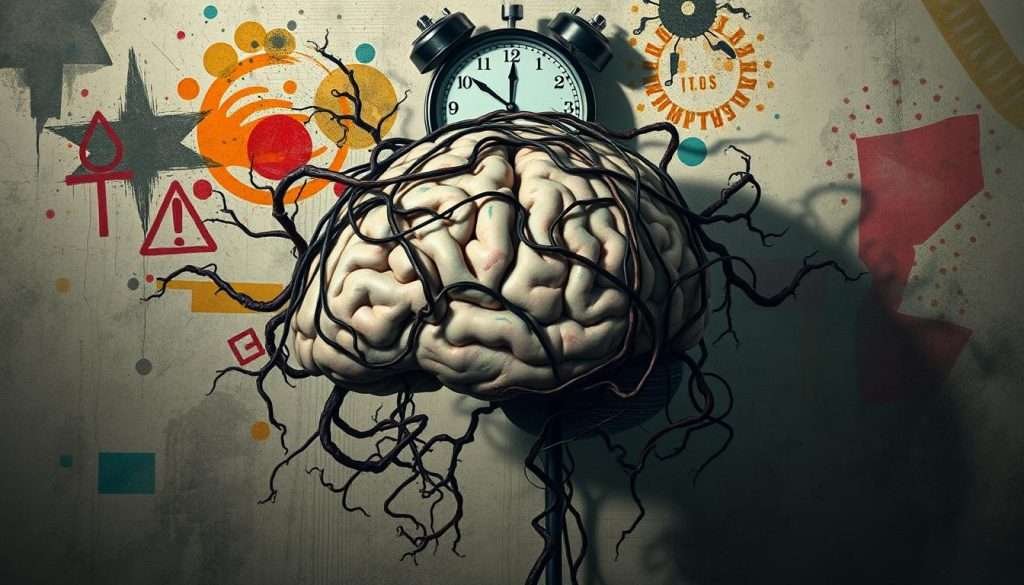Do you feel like the world’s burdens are wearing you down? You’re in good company. Many of us face chronic stress daily. It shadows us everywhere. I clearly remember when job and life pressures began making me sick. Headaches and skin problems started showing up. That’s when I knew stress was ruining my health.
Chronic stress harms us more than we think. Experts like Dr. Richard Lang and Dr. Susan Albers show stress starts in our minds but doesn’t stop there. It leads to heart problems, messed up sleep, and a weak immune system. This piece explores how stress damages our health and lives. It shows how chronic stress attacks our bodies in hidden ways.
Key Takeaways
- Chronic stress can aggravate existing health conditions and trigger new ones.
- Stress lowers the pain threshold, making conditions like arthritis and fibromyalgia worse1.
- Heart disease, high blood pressure, and asthma can be worsened by stress1.
- Headaches and muscle tension are common in those with chronic stress2.
- Stress often leads to digestive and sleep issues3.
- Managing stress well can help reduce its harmful effects3.
Understanding Chronic Stress and Its Impact on Your Body
Chronic stress lasts long and overwhelms our coping skills. It keeps our body’s alarm system, the fight-or-flight response, constantly on. This leads to too much cortisol and other stress hormones, harming our health. It ups the risk of issues like stomach problems, headaches, and heart conditions4.
It can make muscles tense and disturb our digestion and sleep. It even increases chances of stroke and cancer4. Over time, our immune system gets weaker, making us more prone to get sick5.
It doesn’t stop there. It causes breathing problems and puts stress on the heart5. It can also create type 2 diabetes by messing up blood sugar levels5. People under stress may experience stomach issues like heartburn and ulcers5.
Stress also affects our muscles, causing pain across our body5. It’s bad for the brain, too. Studies show it weakens brain areas tied to decision-making6.
To keep good health, managing stress is key. Activities like exercising, meditating, being with loved ones, and breathing exercises help. They counter stress’s negative aspects, boosting well-being46.
Knowing how stress harms our health lets us act to handle it better. This improves our life quality.
How Chronic Stress Affects Your Muscles and Joints
Chronic stress takes a toll on our muscles and joints. Knowing how stress affects them helps us manage our health better. It also helps us avoid stress-related health issues.
Pain and Tension in Muscles
Stress leads to muscle pain, tension, or spasms. During stress, muscles tense up causing pain and discomfort. This tension makes daily life harder and decreases our quality of life.
Aggravation of Arthritis Symptoms
Stress can make arthritis worse. Our body’s response to stress can increase joint pain and stiffness. Managing stress is key to better joint health.
About 25% of Americans feel high stress, according to the American Psychological Association7. About 50% say their stress is moderate. This shows how common stress is.
To fight stress’s bad effects on our muscles and joints, we should stay active and practice mindfulness. Taking steps to manage stress leads to better health.
The Effects of Chronic Stress on Your Heart and Lungs
Chronic stress harms our heart and lungs, which is essential to understand. Our bodies react to constant stress in ways that put our health at risk. This stress can harm our cardiovascular and respiratory systems significantly.
Increased Heart Rate and Blood Pressure
Stress increases our heart rate and blood pressure. These issues can lead to heart attacks and strokes if not handled8. The American Psychological Association says long-term stress raises blood pressure, hiking heart attack, and stroke risks. Job stress is linked to higher blood pressure at work, home, and during sleep9. This high blood pressure can cause hypertension and heart problems.
Respiratory Issues
Stress also puts pressure on our lungs, not just our hearts. It may cause quick breathing or breathlessness. This is bad for people with asthma89. Stress affects our respiratory system deeply, increasing breathing rate and could trigger panic attacks or hyperventilation.
To manage stress’s effects, it’s crucial to use stress relief methods. Techniques like exercising, practicing mindfulness, and building social bonds help. They are key to keeping our hearts and lungs healthy.
| Chronic Stress Effects | Impact on Heart | Impact on Lungs |
|---|---|---|
| Increased Heart Rate | High Blood Pressure | Rapid Breathing |
| Prolonged BP Elevation | Risk of Stroke | Shortness of Breath |
| Job Strain | Heart Attack Risk | Asthma Complications |
The Relationship Between Chronic Stress and Skin Conditions
Chronic stress deeply affects our skin and hair well-being. When stressed, our body lets out stress hormones. These can make skin problems worse and cause hair to fall out. Knowing how stress touches our skin and hair lets us care for them better. It reduces stress’s bad effects on our skin and stops stress-linked hair loss.
Exacerbation of Eczema and Psoriasis
Stress makes issues like eczema and psoriasis worse by causing more inflammation and slowing down the healing of wounds10. The increase in oil and sebum production under stress can also trigger acne, rosacea, and hives10. Stress behaviors, like touching our face often, can make skin problems worse11.
Poor choices, like not enough sleep, bad eating habits, and not keeping up with skincare, add to the trouble.
Hair Loss
Hair loss is a big problem caused by chronic stress. It can lead to telogen effluvium. This is when hair stops growing too soon, making it thin and fall out10. Stress-induced hair loss happens because certain hormones affect hair cells, causing this issue11. Also, stress hormones can impact hair health11.
Impact of Chronic Stress on Gut Health
The gut responds deeply to stress, suggesting a clear connection. Knowing how stress influences our digestion and eating habits is crucial for good health.
Digestive Problems and Stomach Aches
Chronic stress messes with our gut system. It’s often found behind issues like irritable bowel syndrome (IBS) and acid reflux1213. A huge number, 60-70 million Americans, face these digestive challenges with costs hitting $100 billion annually12.
Stress and feeling low worsen conditions like IBS, making the gut ‘leaky’ and inflamed1213. This upset in our gut bacteria balance can cause various stomach problems and aches13.
Eating Disorders
Stress affects how we eat, sometimes leading to not eating enough or overeating. Stressful times might make us eat more fatty foods, upping the risk for weight gain12. Stressful eating habits upset our gut bacteria, showing less variety and more leakiness12.
This can really alter what nutrients we get, stressing the need for a balanced diet. Foods high in fiber, fruits, and veggies support a healthy gut13.
It’s key to manage stress with methods like meditation, deep breathing, and staying active. Healthy habits help our mental state and keep our gut bacteria balanced and happy13.
| Factor | Impact on Gut Health | Source |
|---|---|---|
| Dysbiotic gut environments | Linked to IBS and GERD, causes gut permeability | 1213 |
| Chronic stress | Alters gut microbiota, increases inflammation | 1213 |
| Unhealthy eating patterns | Leads to metabolic changes and gut leakiness | 1213 |
| Diet rich in fiber | Supports healthy gut flora | 13 |
| Stress management | Reduces adverse effects on digestive health | 13 |
The Tension Triangle: Shoulders, Head, and Jaw
Stress hits us hard in what’s known as the “tension triangle.” This includes our shoulders, head, and jaw. This area often feels the most stress. To manage stress better, we need to explore how it affects this region.
Stress-Induced Headaches
Many of us get headaches because of stress, particularly tension headaches. These pains often start in the tension triangle. Tight muscles here can cause a lot of pain. People with desk jobs may see their muscles shorten from tension14. This can lead to headaches that make it hard to work or enjoy life.
Long-term stress makes these headaches worse by tightening our muscles more often15. This constant tightening and loosening can cause ongoing headaches.
Tightness in the Neck and Jaw
TMJ stress is a big problem in the tension triangle. It affects the joint connecting our jaw and skull. Stress can make us clench or grind our teeth, which hurts and makes TMJ worse.
Our necks suffer too. Stress can cause issues in our tension triangle, leading to headaches and stiff necks. High stress can make our necks feel tight, causing pain or spasms14.
Stress tightens our muscles, causing pain or even spasms. This can affect anyone, even those with arthritis or fibromyalgia15. Relaxing and being mindful can really help ease these symptoms.
- Practice relaxation techniques such as deep breathing or meditation.
- Incorporate regular stretching exercises targeting the neck and shoulders.
- Ensure proper ergonomics while working to minimize physical stress.
- Seek professional help if experiencing persistent TMJ stress or headaches.
| Symptom | Cause | Management |
|---|---|---|
| Stress headaches | Muscle tension, poor posture | Relaxation techniques, ergonomic adjustments |
| Neck tightness | Prolonged stress, poor ergonomics | Stretching, posture correction |
| TMJ stress | Jaw clenching, grinding due to stress | Mindful relaxation, professional consultation |
Knowing how stress affects the tension triangle helps us deal with it. By being aware and managing it proactively, we can lessen stress’s impact on our bodies.
How Stress Weakens Your Immune System
Stress can harm our health, but do you know how it affects our immune system? Understanding the link between stress and our immune health is key. This knowledge helps us take better care of ourselves.
Increased Susceptibility to Colds and Flu
Stress boosts cortisol, weakening our immune system. This makes us more likely to get colds and flu. Cortisol lowers lymphocytes, the cells that fight infections16. With fewer defenders, we catch viruses easier, and they hit harder17. So, managing stress is crucial for strong immune health.
Autoimmune Disease Flare-ups
Chronic stress worsens autoimmune diseases. It leads to ongoing inflammation, affecting conditions like arthritis and lupus16. This inflammation causes more severe disease flare-ups. Breaking this cycle requires understanding stress’s role in these conditions.
| Condition | Impact of Chronic Stress |
|---|---|
| Colds and Flu | Increase in susceptibility due to reduced lymphocytes. |
| Arthritis | Severe flare-ups due to heightened inflammation. |
| Lupus | More frequent flare-ups linked to chronic inflammation. |
| Psoriasis | Worsening symptoms caused by stress-related inflammation. |
It’s vital to tackle stress effects on immune health. Coping strategies like meditation, yoga, and good sleep lower cortisol and inflammation161718. Let’s actively manage our stress for better health.
Effects of Chronic Stress on Reproductive Health
Chronic stress can greatly impact our reproductive health. It messes with our menstrual cycles and hormone levels. Let’s dive into how it causes these disruptions.
Irregular Menstrual Cycles
Many women find that chronic stress messes with their menstrual cycles. It throws off the hypothalamus, which is key in controlling the pituitary gland. This gland regulates hormones that kick-start the ovaries. Such disturbances can lead to cycles that are missed, delayed, or just irregular. Research shows that stress and life’s quality are tightly linked. They can worsen each other, making reproductive health problems even bigger. Learn more about stress effects on reproductive19.
Hormonal Imbalances
Stress doesn’t just alter menstrual cycles; it can also cause hormonal imbalances. Our body responds to stress by activating certain hormone systems. These changes can deeply affect a woman’s ability to conceive and her overall hormone health. Studies show that making our mental well-being better can help fix some of these stress-related issues20.
Women facing long-term stress should try healthy ways to take care of themselves. Making realistic goals and feeling thankful can help manage stress. Strong connections and relaxing activities like yoga can lower stress. This, in turn, helps our immune system and supports reproductive health (learn more)19.
Chronic Stress and Sleep Disorders
A good night’s sleep is key to our health, but stress can majorly disrupt sleep. Stress and sleep affect each other—stress can cause sleep problems, and not sleeping well increases stress. This creates a tough cycle. Here’s a look at how chronic stress hurts our sleep and health.

Insomnia and Restless Sleep
Chronic stress often leads to insomnia, including problems falling or staying asleep. This issue affects many of us. It can make us withdraw, get sick easier, and change how we act with others. This makes stress and sleep issues even worse21. High stress at work also ups the chance of getting depressed by 80%, which makes sleep even harder22.
Impact on Overall Health from Sleep Loss
Not sleeping enough because of stress doesn’t just leave us tired. It can harm our health in big ways. For instance, too little sleep can raise the risk of heart issues, obesity, stomach problems, and mental health troubles like anxiety and depression21. Ongoing stress can also make conditions like diabetes and GI problems worse. So, managing stress and sleep is essential22.
Not getting quality sleep drops our ability to handle daily stress. This hits our mental and physical health hard, creating a bad cycle. By understanding the stress-insomnia link, we can work towards better sleep. Activities like exercise and mindfulness can boost our mood and energy, helping lessen stress and its effects on sleep22. For tips on improving sleep, visit this guide on ways to get better sleep tonight.
10 Bad Things Chronic Stress Is Doing to Your Health
Chronic stress is really bad for our health. Knowing how serious its effects are can help us improve our well-being. A study by the American Psychological Association in 2022 found that 76% of people felt stressed in the last month23. This shows how crucial it is to deal with stress early.
Stress affects our immune system badly. It makes us catch illnesses easier, from colds to serious diseases24. Our digestive and reproductive systems suffer too, raising heart attack and stroke risks. It might even make us age faster25. Muscle pains and chest aches also show the damage stress does25.
Stress hits our mental health hard. It leads to issues like anxiety, depression, memory lapses, and trouble focusing25. Stress doesn’t just hurt our minds; it shows up in our bodies too. Problems like eczema, heart disease, and high blood pressure can arise25.
Stress Harms our work life and relationships. Job stress lowers our productivity and challenges our emotional and physical well-being24. Caring for family and handling money worries worsen our health24. These issues pile up, making stress even tougher to handle24.
Some stress can help us in key moments, making us perform better. But, if we don’t manage it, it becomes harmful24. Doing things like exercising, meditating, and enjoying hobbies can help us cope better. These activities are key for good physical and mental health24.
Chronic stress affects too many people. By learning and tackling its effects, we can live better lives. Let’s work towards being less stressed and more balanced together.
Chronic Stress and Unhealthy Weight Gain
Chronic stress plays a big role in gaining unwanted weight. When we’re stressed, our bodies make more cortisol, a hormone. This hormone makes us crave food that’s high in calories, fat, and sugar26. Because of cortisol, eating these foods feels more rewarding. This leads to bad eating habits and gaining weight due to stress27.
Stress also slows down how quickly our bodies burn calories. Research shows that cortisol can make our metabolism slower. A study in 2015 found that stressed women burned 104 calories less than women who weren’t stressed. This could result in gaining 11 pounds in a year if the stress keeps up26.
Gaining weight because of stress can seriously harm our health. Being overweight or obese increases our risk of heart disease, metabolic problems like Type 2 diabetes, and some cancers. These include cancers of the pancreas, esophagus, colon, breast, and kidney27. Extra weight also stresses our joints, causes more pain, and can lead to breathing problems27.
To fight back, managing stress is key. Activities like exercising, eating well, meditating, and mindfulness can lower cortisol. They help with controlling weight27. Setting small goals and being thankful can also help during stressful times27.
Understanding how stress, cortisol, and weight gain are linked helps us take charge of our health. By spotting stress signs early and using strategies to reduce stress, we can avoid the downsides of chronic stress. This helps keep a healthy weight.
Mental Health Consequences of Chronic Stress
Chronic stress doesn’t just affect our bodies. It can deeply impact our minds too. This stress can cause mental health problems, hurting how we feel overall.
Increased Anxiety and Depression
Stress and anxiety are closely linked. The feelings of being anxious due to stress can lead to many health issues. These include trouble sleeping, a weak immune system, stomach problems, heart issues, and reproductive concerns28.
Long-term stress can change the brain, making people more likely to have depression and anxiety29. Changes happen in the brain’s structure, like less gray matter in areas important for mood and thought. This makes chronic stress and mental health problems even worse.

Loss of Interest in Daily Activities
Chronic stress can make us lose interest in what we love. It brings emotional and behavioral problems. This makes enjoying our hobbies and activities hard29.
As stress leads to depression and anxiety, it increases certain harmful substances in our body29. Symptoms like worries, body aches, high blood pressure, and trouble sleeping take away our joy and happiness28.
Conclusion
In conclusion, chronic stress deeply affects our health, showing the need for better stress management and reduction methods. This article highlights stress’s impact on both body and mind. It leads to physical and mental issues, like muscle tension, heart problems, anxiety, and depression.
For example, constant stress can cause ongoing high blood pressure, raising heart disease risk. It makes us crave unhealthy food and gain weight by changing how our body works30.
Understanding how chronic stress harms us is key to finding healthier ways to handle it. Stress can make us age faster and disturb our sleep. This can make our immune system weak, leaving us open to getting sick more easily3130. Also, stress-related inflammation can lead to serious diseases like arthritis and diabetes30.
It’s clear that managing stress well is essential for our health. We can lessen stress’s negative effects by exercising, breathing deeply, meditating, and eating healthy. Let’s encourage each other to live stress-free by staying aware and adopting stress-reducing habits. This can help us build a stronger, healthier life free from chronic stress.
FAQ
What are the physical manifestations of chronic stress?
How does chronic stress affect the immune system?
What impact does chronic stress have on heart health?
Can chronic stress lead to weight gain?
What are the effects of chronic stress on mental health?
How does stress affect gut health?
What is the tension triangle in relation to stress?
How does chronic stress impact sleep?
What are the reproductive health issues caused by chronic stress?
How does chronic stress exacerbate existing health conditions?
Source Links
- 10 Strange Things Stress Can Do to Your Body
- Chronic stress puts your health at risk
- How stress affects your body and behavior
- Chronic Stress Can Hurt Your Overall Health
- The Effects of Stress on Your Body
- Chronic stress: Symptoms, examples, effects, and recovery
- What Does Stress Do to the Body?
- Stress and Heart Health
- Chronic Psychosocial Stress and Hypertension
- Stressed Out Skin: The Link Between Stress and Skin Health
- Brain-Skin Connection: Stress, Inflammation and Skin Aging
- Stress, depression, diet, and the gut microbiota: human–bacteria interactions at the core of psychoneuroimmunology and nutrition
- How Stress Affects the Gut Microbiome
- RELIEVING STRESS: MIND OVER MUSCLE (Published 1986)
- What’s stress doing to your body? | 12th April 2023 | News
- Stress Sickness: Stress and Your Immune System
- How Does Stress Affect the Immune System? – Baptist Health
- How Does Stress Affect the Immune System?
- How stress affects your health
- Lifestyle and fertility: the influence of stress and quality of life on female fertility
- Stress Symptoms: Effects of Stress on the Body
- 10 Health Problems Related to Stress That You Can Fix
- Understanding How Stress Affects the Body
- Effects of Stress and Their Impact on Your Health
- Stress Symptoms, Signs, and Causes – HelpGuide.org
- Stress and Weight Gain: An Unhealthy Connection
- You Guessed It: Long-Term Stress Can Make You Gain Weight
- I’m So Stressed Out! Fact Sheet
- The effects of chronic stress on health: new insights into the molecular mechanisms of brain–body communication
- 9 effects of stress on your body, mind and behavior
- Nine Ways Stress is More Dangerous Than You Think



